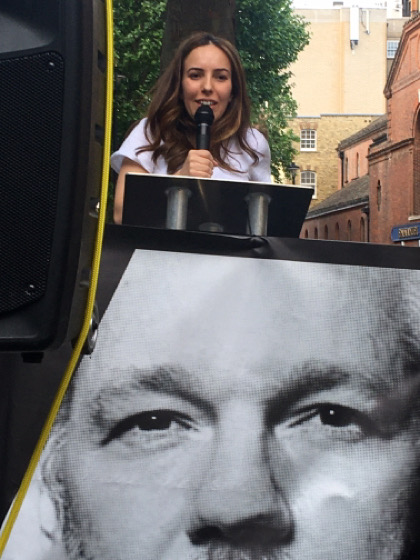Assange – grounds for appeal submitted
JULIAN ASSANGE'S legal team have submitted his Perfected Grounds for Appeal to the High Court. He is appealing against current Home Secretary Priti Patel's decision in June to confirm extraditing Julian to the US, where he faces charges under the Espionage Act for his journalism.(See here for background to Assange's appeal.)

Stella Assange speaks at a demo in solidarity with her husband Julian in May 2022
The Perfected Grounds for Appeal are the precise statements that form the basis for the points that Assange's barristers will rely on when presenting their appeal. In March this year the Supreme Court refused an appeal against its overturning District Judge Vanessa Baraister's decision of 4 January 2021 refusing extradition. The document refers to new evidence that has developed since.
The Grounds for Appeal in Julian's case are that:
- Julian Assange is being prosecuted and punished for his political opinions (section 81(a) of the Extradition Act);
- Julian Assange is being prosecuted for protected speech (Article 10 rights under the European Convention on Human Rights);
- The request itself violates the US-UK Extradition Treaty and international law because it is for political offences, which are specifically excluded by the Treaty;
- The US government has misrepresented the core facts of the case to the British courts; and
- The extradition request and its surrounding circumstances constitute an abuse of process.
The above arguments were put in Julian's original appeal hearing but were not then accepted by the court. Most of the arguments and counter-arguments in that hearing and subsequent hearings and rulings have turned on assessments of Julian's mental health, his "suicide risk", subsequent assurances given by lawyers for the US on the type of prison regime that he would face, and whether these assurances were credible.
The Perfected Grounds for Appeal also assert that Patel erred in her decision, and that the extradition request itself breached the Extradition Treaty between the UK and the government of United States Article 4, which states that "Extradition shall not be granted if the offence for which extradition is requested is a political offence."
Current Home Secretary Priti Patel is not expected to remain in post beyond early September, when a new Prime Minister is expected to put someone else in the post. Any of the likely successors as Home Secretary are, however, expected to display a level of vindictiveness equal to Patel's - or worse. So no change of Home Secretary is expected to have any effect on Julian's appeal.
The High Court has not yet confirmed whether it will give permission for Assange's appeal to be heard. It may yet decide not to do so. Other appeal routes are still open, including an appeal to the European Court of Human Rights. That is an institution of the Council of Europe, not the EU, so it still has jurisdiction in the UK.
Meanwhile, there is a solidarity demonstration for Julian on Saturday 8 October, in the form of a human chain surrounding the Palace of Westminster - which includes the Houses of Parliament - and over Westminster Bridge.
Organisers are seeking 5000 people to pledge to attend the demo. That is the number of people they estimate are needed to complete this chain. At the time of writing, just over half that number have pledged to attend. Details are here.
For the NUJ's comments on the importance of supporting Assange's case, and its implications for journalism, see here.
![[Freelance]](../gif/fl3H.png)